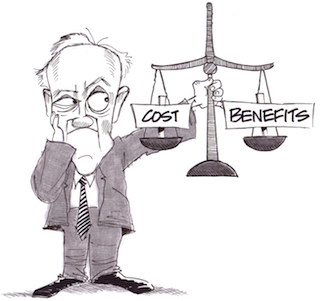Most of Your Choices are Completely Irrational
I experience a kind of pleasure every time someone exposes how completely irrational humans can be. If only everyone could take this understanding of irrationality to heart an make a plan to improve and/or work around it to make life better for all the people who pay the price for our collective irrationality.
Essentially, our perception of a scenario is the primary determinant of what choice we will make - so as in the example that Dan gives above, when our perceived options become more difficult we are not necessarily going to choose the best or most rational option. This is similar to how problems are solved in many spheres of our society. In my Public Administration modules I learned about the different ways to solve a problem and it boiled down to 3 options:
- Choose the first solution that solves at least part of the problem
- Spend a little bit more time looking for solutions - here you end up in the "middle ground" - not the best solution but also not the worst
- Or (and this is the least used) Take as much time as necessary to find the best possible solution.
It appears that our default programming is set to "choose the easiest solution" even if it's not the best option. I would say that this tendency ties in with something Dan Gilbert was discussing in one of his TED Talks regarding how we will weigh up the cost of doing something, the odds that we will succeed and the potential reward - even though our perception of the costs and rewards is often way off the mark. This is another Talk I definitely recommend - it's filled with all sorts of interesting irrational behaviours being exposed.
Now, as Dan Ariely says at the end of his Talk, if we as a people can recognise our "faults" and work to overcome them, or at least design every part of our lives to consider these "faults", then this life would be very different. Instead, a few people who do understand these tendencies choose to exploit them and keep everyone ignorant of the whole situation.
I support that any person is able to become aware of and change their apparent nature to overcome any fault. The tools through which to do this seem simple to some, but using these tools can be one of the most difficult things you can do in your life - changing your very nature requires discipline and dedication that most people have simply never needed to apply in their lives.

I'll give you one more example for this. This is from a paper by Redelmeier and Schaefer. And they said, "Well, this effect also happens to experts, people who are well-paid, experts in their decisions, do it a lot." And they basically took a group of physicians. And they presented to them a case study of a patient. Here is a patient. He is a 67-year-old farmer. He's been suffering from a right hip pain for a while. And then they said to the physician, "You decided a few weeks ago that nothing is working for this patient. All these medications, nothing seems to be working. So you refer the patient to hip replacement therapy. Hip replacement. Okay?" So the patient is on a path to have his hip replaced. And then they said to half the physicians, they said, "Yesterday you reviewed the patient's case and you realized that you forgot to try one medication. You did not try ibuprofen. What do you do? Do you pull the patient back and try ibuprofen? Or do you let them go and have hip replacement?" Well the good news is that most physicians in this case decided to pull the patient and try the ibuprofen. Very good for the physicians.
The other group of the physicians, they said, "Yesterday when you reviewed the case you discovered there were two medications you didn't try out yet, ibuprofen and piroxicam." And they said, "You have two medications you didn't try out yet. What do you do? You let them go. Or you pull them back. And if you pull them back do you try ibuprofen or piroxicam? Which one?" Now think of it. This decision makes it as easy to let the patient continue with hip replacement. But pulling them back, all of the sudden becomes more complex. There is one more decision. What happens now? Majority of the physicians now choose to let the patient go to hip replacement. I hope this worries you, by the way -- (Laughter) when you go to see your physician. The thing is is that no physician would ever say, "Piroxicam, ibuprofen, hip replacement. Let's go for hip replacement." But the moment you set this as the default it has a huge power over whatever people end up doing. - Dan Ariely
I originally wrote this post here: http://activistsjourneytolife.blogspot.co.za/2014/10/day-613-most-of-your-choices-are.html